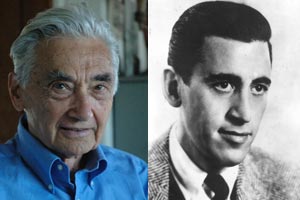4 February 2010 Edition
Deaths of Howard Zinn and J.D. Salinger

Howard Zinn and J.D. Salinger
Two very different legacies
BY ROBBIE SMYTH
Two icons of U.S. literature, born just four years apart, died last week. Howard Zinn, political activist and author of the groundbreaking A People’s History of the United States, died aged 87. Cult novelist and author of Catcher in the Rye, J.D. Salinger, died aged 91.
Both were from New York, from similar religious backgrounds, and they shared experiences such as military service in World War II. Although both had an immense impact through their writings, as both put the ordinary disenfranchised dispirited person at the centre of their work, they were very different people and their lives were in stark contrast to each other.
Salinger’s characterisation of Holden Caulfield has sold an estimated 65 million copies, while Zinn’s People’s History has hit the 2 million mark, an impressive feat for an unashamedly left-wing radical view of U.S. history, and the fact that it is a textbook.
Salinger’s Catcher in the Rye has become a seminal novel. For millions of teenagers and many adults his book has been a starting point for those trying to forge their paths in the twisted hypocritical world that was the consumer society of the late 20th century.
Zinn’s People’s History provides an account of U.S. development far from the hype of the faith of the founding fathers and a promised land stretching from “sea to shining sea”.
Zinn’s upbringing was much harsher than that of Salinger and it was the post-war GI Bill that brought him through college and eventually teaching at Boston University. Zinn campaigned for civil rights and an end to segregation. He was an early and consistent advocate against the war in Vietnam.
Zinn’s adult life was one of advocacy and activism, while Salinger took refuge in being a recluse, his life characterised by that one book and an insatiable public interest in his private life and whether he was writing new work.
Zinn as a writer, teacher and activist never ceased working. In mid-January the History Channel released a DVD of a series written and narrated by Zinn of well-known actors and musicians reading and performing historical documents ranging from the letters of slaves to the Declaration of Independence.
Central to Zinn’s historical approaches was his assertion that “there is no such thing as impartial history”, and his work has always had that core trait. Zinn wrote not just historical texts but three plays and in recent years devoted an extensive five-year period to collecting and cataloguing first-hand accounts of key periods of U.S. history published as Voices of a People’s History of the United States.
Zinn’s impact stretched beyond the United States, particularly in the context of his approach to historical study.
And so we have a people’s history of Canada, Britain, the Internet and even Hip Hop. In 2008, A People’s History of American Empire was a collaboration between Zinn and cartoon artists Mike Konopacki and Paul Buhle.
The DVD of People Speak includes music from Bruce Springsteen and Bob Dylan, with readings by Matt Damon, Morgan Freeman, Vigo Morgenstern, Danny Glover, Josh Brolin and Marisa Tomei.
Howard Zinn has left us not just an impressive body of work, but an inspired way of viewing the world, found in areas as diverse as The Daily Show on Paramount Comedy to in-depth academic research. He also left us with the need to be ever zealous in tackling injustice, whether it is in far-off wars, domestic government policy or indeed in your own street or office.
Zinn’s message is there – there is no place for impartiality.
